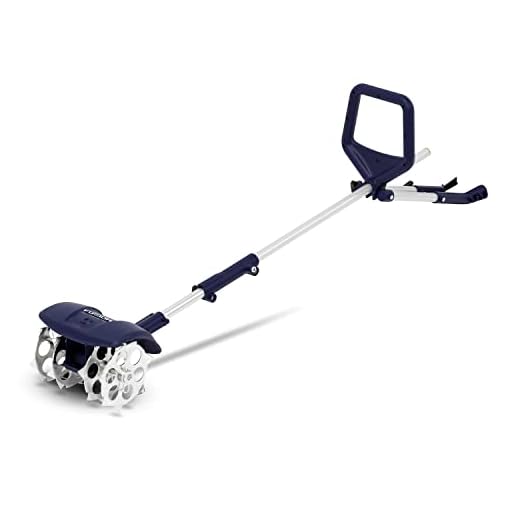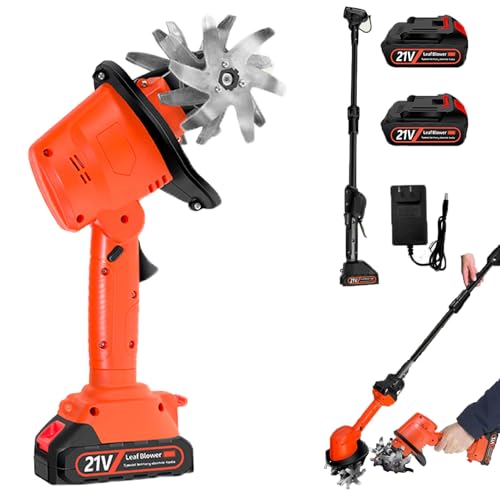




A tiller cultivator is a versatile tool used in gardening and farming to prepare the soil for planting and growing crops. It is a mechanical device that is designed to break up and loosen compacted soil, removing weeds, and mixing in organic matter such as compost or fertilizer.
The main purpose of a tiller cultivator is to create a favorable environment for plants by improving soil structure and providing better drainage. By breaking up hard soil clumps, it allows plant roots to penetrate and access essential nutrients and water. It also helps to remove weeds, which compete with plants for nutrients and sunlight.
Using a tiller cultivator is an efficient way to save time and energy compared to manual digging and tilling. It is especially useful for larger areas or for those with physical limitations. The machine is powered by an engine or electric motor that drives rotating tines or blades, which churn and dig into the soil.
There are different types of tiller cultivators available, such as rear-tine, front-tine, and mini-tillers. Rear-tine tillers are more powerful and ideal for heavy-duty tasks, while front-tine tillers are more suitable for smaller gardens or light-duty work. Mini-tillers, also known as cultivators, are lightweight and maneuverable, making them perfect for tight spaces and smaller jobs.
Overall, a tiller cultivator is a valuable tool for maintaining healthy and productive soil for gardening and farming. It helps to create an optimal growing environment for plants, saving time and effort in soil preparation.
Understanding the Role of a Tiller Cultivator in Gardening
A tiller cultivator is a versatile tool used in gardening to prepare the soil for planting and cultivating various types of crops. It is designed to break up the soil, mix in organic matter, and create a loose, well-aerated bed that promotes healthy root growth and better nutrient absorption.
Breaking Up the Soil
One of the primary functions of a tiller cultivator is to break up compacted soil. Over time, the soil in a garden can become densely packed, making it difficult for plant roots to penetrate and absorb nutrients. The tiller cultivator helps to loosen the soil, allowing air, water, and nutrients to penetrate deeply.
By breaking up the soil, the tiller cultivator also helps to control the growth of weeds. Weeds thrive in compacted soil, but when the soil is loosened, their roots cannot establish a strong hold, making it easier to remove them.
Mixing in Organic Matter
Another important role of a tiller cultivator is to mix in organic matter, such as compost or manure, into the soil. Organic matter improves soil structure, increases nutrient availability, and enhances moisture retention. The tiller cultivator evenly distributes organic matter throughout the garden bed, ensuring that all plants have access to the benefits it provides.
When organic matter is incorporated into the soil, it also helps to improve its water-holding capacity. This is particularly important in areas with sandy soil, where water tends to drain quickly. The tiller cultivator’s ability to mix in organic matter helps create a soil environment that retains moisture, reducing the need for frequent irrigation.
In addition, organic matter enhances the biological activity in the soil by providing a food source for beneficial microorganisms. These microorganisms break down organic matter, releasing nutrients that are essential for plant growth.
In conclusion, a tiller cultivator plays a crucial role in gardening by breaking up compacted soil, mixing in organic matter, and creating a well-aerated and nutrient-rich planting bed. By using this tool, gardeners can create an optimal environment for plant growth and maximize their harvests.
Benefits of Using a Tiller Cultivator
A tiller cultivator is a versatile and efficient tool that offers several benefits to gardeners and farmers. Here are some of the advantages of using a tiller cultivator:
| 1. Time-saving | A tiller cultivator can quickly prepare the soil for planting by breaking it up and mixing in organic matter. It saves significant time and effort compared to doing the same job manually with a shovel. |
| 2. Improved soil structure | The powerful tines of a tiller cultivator help break up compacted soil and create a loose and friable texture. This improves the soil structure, allowing plant roots to penetrate easily and access nutrients, water, and oxygen. |
| 3. Weed control | Using a tiller cultivator can help control weeds by uprooting them and burying their seeds deep in the soil. The disturbance caused by tilling also hampers the growth of weeds, reducing the need for chemical weed control. |
| 4. Enhanced nutrient absorption | By loosening the soil, a tiller cultivator improves the nutrient absorption capacity of plants. It allows fertilizers and organic matter to mix thoroughly, ensuring that nutrients are readily available to plant roots. |
| 5. Aeration and drainage | Tilling the soil with a tiller cultivator enhances soil aeration and drainage. It creates channels for air and water movement, preventing waterlogging and promoting healthy root development. |
| 6. Preparation for planting | A tiller cultivator is an excellent tool for preparing the soil for planting. It can create seedbeds, rows, and furrows, making it easier to sow seeds or transplant seedlings in a well-prepared and organized manner. |
| 7. Versatility | Tiller cultivators come in various sizes and designs, making them suitable for use in different garden and farm settings. Whether you have a small backyard garden or a large agricultural field, there’s a tiller cultivator that can meet your specific needs. |
| 8. Cost-effective | Investing in a tiller cultivator can be cost-effective in the long run. By reducing the need for manual labor and improving soil health, it can lead to increased productivity and better crop yields, ultimately saving time and money. |
In conclusion, a tiller cultivator offers numerous benefits, including time-saving, improved soil structure, weed control, enhanced nutrient absorption, aeration and drainage improvement, preparation for planting, versatility, and cost-effectiveness. It is a valuable tool for anyone involved in gardening or farming.
Practical Applications of Tiller Cultivators
Tiller cultivators are versatile tools that can be used for a wide range of gardening and landscaping applications. They are designed to break up soil, remove weeds, and prepare the ground for planting. Here are some practical applications of tiller cultivators:
1. Garden Preparation
Tiller cultivators are ideal for preparing garden beds before planting. They can quickly and efficiently loosen compacted soil, making it easier for plants to grow and thrive. By breaking up the soil, tiller cultivators create a loose and fertile environment for plant roots to develop.
2. Weed Control
One of the main advantages of tiller cultivators is their ability to control weeds. By tilling the soil, these tools disrupt weed growth and expose weed roots to air and sunlight, which effectively kills them. Tiller cultivators can help maintain weed-free gardens and save gardeners time and effort.
Tiller cultivators eliminate the need for hand weeding and the use of harsh chemicals, making them an environmentally friendly option for weed control.
3. Soil Aeration
Compact soil can hinder root growth and the movement of air, water, and nutrients through the soil. Tiller cultivators are an excellent tool for aerating the soil by breaking up compacted layers. This process improves soil structure and allows the roots to absorb nutrients more efficiently.
Furthermore, soil aeration enhances water drainage and prevents waterlogging, which can lead to root rot and other plant diseases.
In conclusion, tiller cultivators are essential tools for gardeners and landscapers. They make garden preparation easier, control weeds effectively, and improve soil aeration. Investing in a tiller cultivator can save you time, energy, and money in the long run, ensuring a successful gardening experience.
Choosing the Right Tiller Cultivator for Your Needs
When it comes to selecting a tiller cultivator for your gardening needs, there are several factors to consider. From the size of your garden to the type of soil you have, choosing the right tiller cultivator can make a big difference in the success of your gardening endeavors.
One of the first things to consider is the size of your garden. If you have a smaller garden or are working in tight spaces, a smaller, more compact tiller cultivator may be the best choice. These models are often easier to maneuver in tight areas and are ideal for smaller planting beds or raised gardens.
On the other hand, if you have a larger garden or need to work a larger area, a larger tiller cultivator may be necessary. These machines are typically more powerful and can handle tougher soil conditions. They are also a good option if you plan on using your tiller cultivator for heavy-duty tasks such as breaking new ground or tilling in large amounts of compost or mulch.
Another important factor to consider is the type of soil you have. Different tiller cultivators are designed to work with different soil types. Some models are better suited for softer, loamy soils, while others are designed to handle heavier, clay-like soils. It’s important to choose a tiller cultivator that is compatible with your soil type to ensure optimal performance.
Additionally, you’ll want to consider the features and attachments that are available for different tiller cultivator models. Some models come with adjustable tilling widths, allowing you to work in a variety of bed sizes. Others may have adjustable tilling depths, giving you greater control over the depth of your tilling. Different types of tines, such as forward rotating or counter-rotating tines, can also affect the performance and versatility of your tiller cultivator.
Lastly, it’s important to consider your own physical abilities and comfort when choosing a tiller cultivator. Some models have features such as padded handles and adjustable height handles, which can make the machine more comfortable to use. Additionally, electric-powered models may be easier to start and operate compared to gas-powered models.
In conclusion, when selecting a tiller cultivator for your gardening needs, it’s important to consider factors such as the size of your garden, the type of soil you have, the available features and attachments, and your own physical abilities and comfort. By taking these factors into account, you can choose the right tiller cultivator that will help you achieve the best results in your garden.







